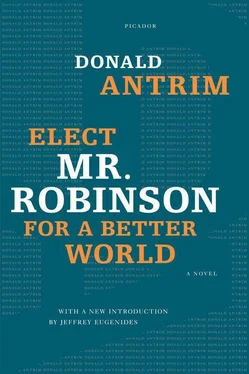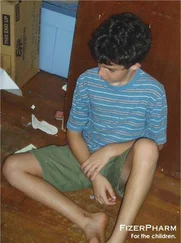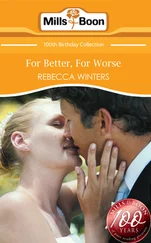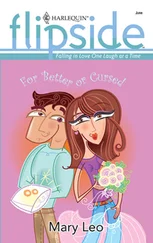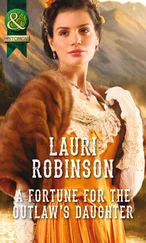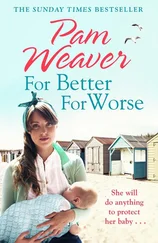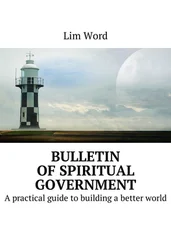I could’ve left, and maybe should’ve. I could’ve gone upstairs and gotten undressed and stood awhile in a hot shower, then toweled off and shaved and brushed my teeth and, perhaps, if I’d felt the patience for it, flossed. Or I could’ve gone downstairs to the basement and tinkered with my miniature dungeon. There was no end of fine painting to do, delicate detailing with a fine artist’s brush. I had plans to refine the rack installation in minor yet significant ways — realizing detail of a different kind, structural, using balsa or one of the rich tropical hardwoods: gumbo-limbo or — if the mood struck and my X-acto blades were sharp enough to get a good cut — softer, malleable mango; and also I had lately been mentally dramaturging possibilities for figures to occupy the scene: a hooded Inquisitor fashioned from a refigured toy soldier, gesticulating and ranting articles of faith while brandishing an illuminated manuscript before a martyr T-pinned to a Styrofoam wall.
Needless to say, I didn’t descend to the basement. I didn’t leave my sweetheart’s side.
I put down my cup of cold coffee, closed my eyes, and listened to Bob say, “Venture into darkness. Open your inner eyes. Gaze into the mental whorl…”
In and out I breathed. My heart was pounding and my head was heavy. I wanted Meredith in the worst way.
“Prepare to dive!” the voice of the anthropology professor commanded.
Followed by: “Find your animal!”
What happened after that is something I’d rather not go into. Not right now at any rate.
It’s too painful, too embarrassing.
Anyway, I have town meeting minutes to type. I believe I mentioned these earlier — all that business of voluntary mine sweeps of Turtle Pond Park, funding for the library, etc. It’s my duty as Town Scrivener to record and type such official civic business of the body politic.
Why did I ever volunteer for this distasteful service? The answer is simple: to burnish my public image. Certainly I hold no ambition for secretarial tasks. Which goes a long way toward explaining — though I realize it’s hardly an excuse — it goes a long way, this clear lack of enthusiasm for the mediocre in life, toward explaining why I’m so far behind on the minutes. I should’ve filed them ages ago.
Maybe in a while I’ll come back to that Saturday morning with Meredith and Bob in the living room. However, now I need a breather, and work, I’ve found, is the only true way to forget pain and sorrow.
The minutes here on my desk offer a challenge. Not only are they hastily handwritten, they’re also smeared — the ink is smeared in blurry, psychedelic patterns. Some fool must’ve accidentally placed a water or beer glass on the paper. I may have to fudge the illegible passages. Also, many pages are torn, which is in a way fitting considering that this is an account of a wild night. I refer of course to the big town meeting at Terry Heinemann’s Clam Castle, out at the end of Fountain Lane where Fountain dead-ends into the municipal beach parking lot.
Everything started innocently. It was Saturday night, the night after my burial expedition with the foot. Other pieces of Jim waited at home in the freezer. I felt weary and frantic about life. The Clam Castle was crowded with taxpayers: Jerry, Bill, Abe, Tom, Robert, Betsy, Dick, and many other business professionals including several of my old teaching colleagues: Alan, Simone, Doug; and all the spouses, too, along with a few children old enough to be trusted to stay quiet during open discussion; and Meredith’s mother, Helen, who hated the status quo and was apt to be vociferous; and, of course, Terry, whose generous all-you-can-eat-for-one-special-low-price deal was the reason we were convened at the Clam Castle in the first place. Terry went from table to table, jotting down orders for cherrystones on the half shell, clam rolls, sodas and coffee. On the slate for that night’s meeting: the above-mentioned topics (domestic conflict in Turtle Pond Park, the dying library system — what to do), plus various proposals for licensing and regulating construction of pits, moats, mounds, craters, furrows, ditches, channels, trenches, follies, bastions, breakwaters, balustrades, barricades, battlements, bulwarks, and all other acropolis-like structural additions to private houses, garages, and utility sheds in residential areas. It was only a short time, a couple of weeks, since the death of the ex-mayor, and though no one in town was talking much about Jim Kunkel, at least not publicly, not out loud, well, the spirit of the man, his memory, hung heavy in the seafoody air.
I had a plate of cherrystones. Meredith stood over by the unplugged jukebox, which hulked like a dead thing. She looked lovely leaning against its massive flanks, chatting with her mother. Helen Mooney was dressed in a lemon-yellow pants suit; she wore her steel-wool hair in a bun. The mother seemed so small next to the daughter. I clicked my ballpoint and spread my notepad on the big wooden picnic table covered in red-checked vinyl. The restaurant lights, imitation “harborside” gas globes, burned low, but there were candles on the tables, gentle candlelight lighting my notebook pages and the faces of my table companions: Jerry, Rita, Barbara Nixon. Barbara looked unhappy and sexy, the latter quality due to the slinky manner in which her clothes fell off her shoulders, presenting superb tan lines. She dined, as did Rita, on seafood salad. Terry’s Clam Castle seafood salads are pretty good, not just lettuce and a couple of boiled shrimp. I was beginning to wonder if I maybe should’ve gotten a seafood salad myself, instead of the cherrystones, which don’t go far. I looked around to place an order with Terry, or with Claire, Terry’s aloof, angry waitress, and I saw Meredith waving to me, and I waved back; but when Meredith continued to wave I realized she wasn’t waving to me at all, she was welcoming Bob, just arrived and securing a seat at the table next to mine, Bill Nixon’s table. Why were Bill and Barbara not sitting together? Were they fighting? Nixon had a plate of clams like mine. I watched him squeeze a lemon over it — the whole lemon, not just a wedge. Abraham de Leon’s voice boomed jovially from over near the men’s room. What would Abe be dining on tonight? The whole menu, probably. Jerry, next to me, was halfway through a clam roll. Jerry’s clam roll looked and smelled delicious, and I decided that this, the clam roll drenched in tartar sauce, would, if I could only flag Terry or Claire, constitute my next order.
Jerry crunched and swallowed a deep-fried morsel. He slurped some coffee, then rose to his feet and addressed the crowd: “Okay, people, let’s come to order.”
The room gradually got quiet. Jerry said, “We have many articles of interest before us. I suggest we skip the formalities and proceed straight to business.”
“Second,” called Tom.
“All in favor say aye.”
“Aye,” came the group response. “Nays?” queried Jerry. The floor was silent. Jerry continued, “The chair will now entertain motions,” at which point Tom Thompson rose from his seat at the bar and said, “I believe tonight’s topics are in many ways interrelated, and so propose that they be discussed concurrently, as one issue, rather than separately.”
“Hmn,” said Jerry. There was a period of thoughtful murmuring about this idea. It was a fine point requiring subtlety of mind to appreciate, and therefore surprising, coming from Tom. Jerry, apparently aiming to avoid complexity, declared, “The chair appreciates the speaker’s motion and takes it under advisement for future deliberation. Yes, in the back there?”—referring to a red-haired woman wearing a nurse’s uniform. She was Mary Brown, a staffer at the hospital emergency room, and a divorced mother of two. Mary Brown stood and read from a legal pad, “I represent a group of mothers who have signed a petition”—waving her pad—“calling for action in the matter of these moats and trenches and et cetera, so popular of late in the community. Not only are such additions to property unsightly, they pose certain danger to children and pets. Allow me to read a partial inventory of pit-related injuries treated during the last month at Anhinga Memorial. Harley Geer, aged seven, extensive cuts about the legs, arms, and face when he chased a ball into a neighboring lawn ringed by a ditch filled with broken window glass. Sheila Wells, aged fourteen, near loss of a foot after stumbling into a big hole full of steel animal traps, many rusted. Drew Smith, aged sixteen—”
Читать дальше
